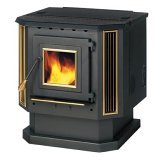Pellet stoves are hot. Over 50% of stoves bought in the U.S. in 2008 were pellet-fueled, according to the Pellet Fuels Institute.
 Any kind of wood-burning appliance causes concern for fire insurance companies. Insurers are often slow to adapt to new technology, since they rely on experience statistics to help them set rates and underwriting guidelines. However, most insurers understand the popularity of these stoves, and are trying to accomodate home owners who use them.
Any kind of wood-burning appliance causes concern for fire insurance companies. Insurers are often slow to adapt to new technology, since they rely on experience statistics to help them set rates and underwriting guidelines. However, most insurers understand the popularity of these stoves, and are trying to accomodate home owners who use them.
Operated and maintained properly, well-built stoves can be a safe, economical way to heat your home. If you buy one, your insurance company will probably ask some questions about it. Here are some of the insurance company guidelines we’ve seen.
5 Keys to Making Your Pellet Stove Insurable
- Make sure your stove is UL listed. Many U.S. insurers will only insure American or Canadian built pellet stoves.
- Many companies will only insure top-fed stoves. Bottom and side-fed stoves are considered to be harder to consistently maintain. This may change with future designs and as more experience develops.
- Avoid an appliance that is capable of burning Standard PFI rated pellets. Some insurers will not accept them.
- Although manufacturers’ requirements may be more lenient, insurance companies tend to require the same heat shielding and fireproof hearth as they would for a standard wood stove.
- If your stove has a power exhaust vent, many companies require a 1 foot projection of the vent from any combustibles (e.g. siding) through an approved thimble. Because power exhaust vents require electricity, several insurers require a battery backup or generator to prevent a puff-back in a power outage.
It’s always smart to ask your agent or insurance company before installing a wood-burning appliance. If you have any questions, contact Noyes Hall & Allen Insurance .


